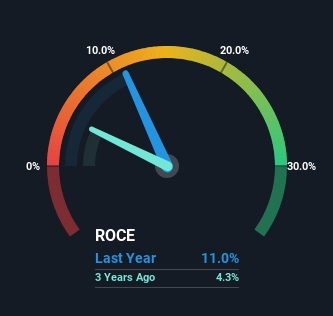Returns On Capital At Associated British Foods (LON:ABF) Have Stalled
What trends should we look for it we want to identify stocks that can multiply in value over the long term? Amongst other things, we'll want to see two things; firstly, a growing return on capital employed (ROCE) and secondly, an expansion in the company's amount of capital employed. Ultimately, this demonstrates that it's a business that is reinvesting profits at increasing rates of return. With that in mind, the ROCE of Associated British Foods (LON:ABF) looks decent, right now, so lets see what the trend of returns can tell us.
What Is Return On Capital Employed (ROCE)?
If you haven't worked with ROCE before, it measures the 'return' (pre-tax profit) a company generates from capital employed in its business. The formula for this calculation on Associated British Foods is:
Return on Capital Employed = Earnings Before Interest and Tax (EBIT) ÷ (Total Assets - Current Liabilities)
0.11 = UK£1.7b ÷ (UK£19b - UK£3.5b) (Based on the trailing twelve months to March 2024).
Therefore, Associated British Foods has an ROCE of 11%. That's a relatively normal return on capital, and it's around the 12% generated by the Food industry.
View our latest analysis for Associated British Foods
Above you can see how the current ROCE for Associated British Foods compares to its prior returns on capital, but there's only so much you can tell from the past. If you'd like, you can check out the forecasts from the analysts covering Associated British Foods for free.
What Does the ROCE Trend For Associated British Foods Tell Us?
While the current returns on capital are decent, they haven't changed much. The company has consistently earned 11% for the last five years, and the capital employed within the business has risen 48% in that time. 11% is a pretty standard return, and it provides some comfort knowing that Associated British Foods has consistently earned this amount. Over long periods of time, returns like these might not be too exciting, but with consistency they can pay off in terms of share price returns.
The Bottom Line On Associated British Foods' ROCE
In the end, Associated British Foods has proven its ability to adequately reinvest capital at good rates of return. In light of this, the stock has only gained 13% over the last five years for shareholders who have owned the stock in this period. So to determine if Associated British Foods is a multi-bagger going forward, we'd suggest digging deeper into the company's other fundamentals.
If you're still interested in Associated British Foods it's worth checking out our FREE intrinsic value approximation for ABF to see if it's trading at an attractive price in other respects.
If you want to search for solid companies with great earnings, check out this free list of companies with good balance sheets and impressive returns on equity.
Have feedback on this article? Concerned about the content? Get in touch with us directly. Alternatively, email editorial-team (at) simplywallst.com.
This article by Simply Wall St is general in nature. We provide commentary based on historical data and analyst forecasts only using an unbiased methodology and our articles are not intended to be financial advice. It does not constitute a recommendation to buy or sell any stock, and does not take account of your objectives, or your financial situation. We aim to bring you long-term focused analysis driven by fundamental data. Note that our analysis may not factor in the latest price-sensitive company announcements or qualitative material. Simply Wall St has no position in any stocks mentioned.
Have feedback on this article? Concerned about the content? Get in touch with us directly. Alternatively, email editorial-team@simplywallst.com

 Yahoo Finance
Yahoo Finance 
